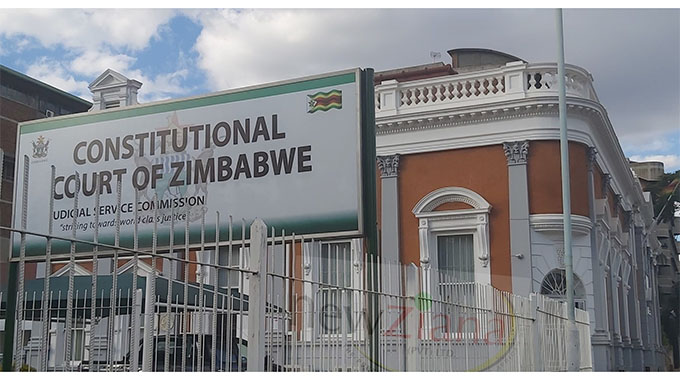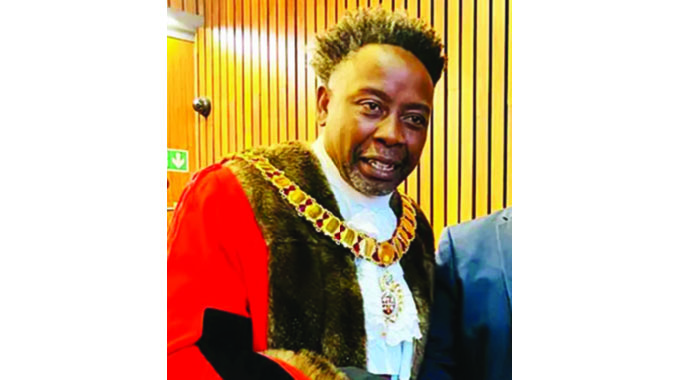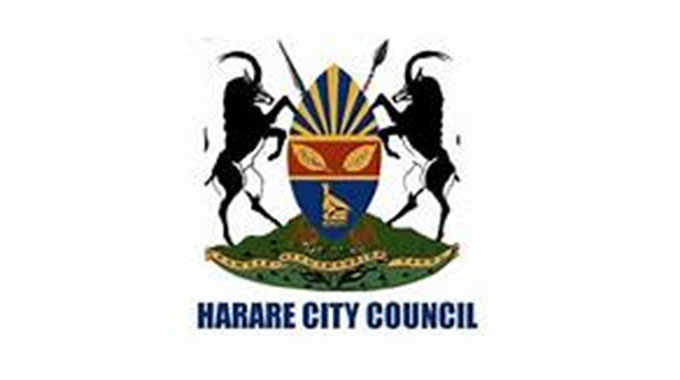ConCourt backs RBZ on US dollar conversion

Fidelis Munyoro-Chief Court Reporter
The 2018 decision by the Reserve Bank of Zimbabwe (RBZ) to convert all US dollar balances in Zimbabwean bank accounts to local currency was quite constitutional the Constitutional Court ruled yesterday in a unanimous decision.
Refusing to confirm a High Court judgment that declared in February this year the Reserve Bank of Zimbabwe’s exchange control directive which converted US dollar balances to local currency unconstitutional, the court went further and set aside the entire judgment by Justice Joseph Mafusire.
An architect practice won at the High Court bid to have money deposited into their bank account during dollarisation retained as foreign currency instead of being automatically converted into local currency.
Justice Mafusire ordered CABS, a commercial bank, to pay the practice partners Ms Penelope Douglas Stone and Mr Richard Harold Stuart Beatie back the US dollars converted into local currency within seven days. But the judgment remained suspended until the Constitutional Court confirmed the matter in terms of Section 175 of the Constitution.
While the High Court can make a constitutional ruling this remains on ice until the Constitutional Court has signified its assent.
And on Tuesday, the confirmation proceedings were heard and determined by the full Constitutional bench which unanimously refused to confirm the judgment of the High Court.
The court went further and set aside the whole of the judgment of the lower court. Full reasons of the Constitutional Court would be made in due course.
Ms Stone and Mr Beatie have been through a similar route before when they sued CABS, RBZ and the Ministry of Finance and Economic Development at the High Court over US$142 000 deposited in the practice business account.
They won in the High Court that time as well, but saw the ruling overturned in the Supreme Court on the basis that since no argument on the constitutionality of the RBZ directive RT 120/2018 and section 44B (3) and (4) of the Reserve Bank Act had been presented, the matter was not properly before the court and the High Court had erred in making its ruling.
It also agreed with the CABS argument that it had to obey a directive from its regulator, the Reserve Bank.
The legal contest between the two and their bank spilled into the High Court following RBZ exchange control directive RT120/2018 issued on October 4, 2018. But the final Supreme Court judgment meant that this directive was still in force.
However, in August 2021, Ms Stone and Mr Beatie were back at the High Court over the same issue but the push was now different, as they sought the setting aside of the Exchange Control Directive RT120/2018 and a raft of some legislative provisions of the Reserve Bank Act and of the Finance (No. 2) Act of 2019 for allegedly violating Section 71 of the Constitution which guarantees the protection to property rights.
They targeted provisions that allegedly violated s35(1) of the Exchange Control Regulations, SI 109 of 1996, including s44B (3) and (4) of the Reserve Bank Act plus s 22(1)(b) and (d), s 22(4)(a) and s 23(1) and (2) of the Finance Act.
The pair argued that the process was an infraction of their constitutional right to property and sought the reversal of the act of the conversion by their bank the deposit of US$142 000 to RTGS, which they allege was done on the authority of the monetary policy statements, the Exchange Control Directive RT120/2018.
Justice Joseph Mafusire declared two portions of the directive unconstitutional and ordered CABS to pay the two their US$142 000, together with interest at the prescribed rate of 5 percent a year from November 28, 2016, to the date of payment.
The judge found that two paragraphs of the directive allowed CABS and the Finance Minister to interfere improperly with the contractual rights and obligations as existing between the two architects and CABS, resulting in the deprivation of the applicants’ right to property in breach of s 71(2) of the Constitution.
The judge also ruled that the particular directive breached the Exchange Control Regulations of 1996 since those regulations did not give the power to issue the directive.
But in a similar case involving CABS, a different judge of the High Court, Justice Webster Chinamora, a few days later differed with his brother judge ruling that CABS could not pay a client US$179 000 in foreign currency, being the balance converted to local currency at the height of currency reforms in 2019 saying courts have no power to review Government policy on banking matters.
Mr Duncan Hugh Cocksedge had approached the High Court seeking an order compelling the bank to pay him the money it effectively converted to local currency in his account back to US dollars.
He also sought to impugn the Reserve Bank of Zimbabwe exchange control directive converting US dollars’ accounts into RTGS accounts as unconstitutional.
But Justice Chinamora refrained from deciding what he saw as a pure political question. He ruled that Mr Cocksedge’s claim for repayment of his money in foreign currency was contemptuous of the Government’s policy directive.
The judge took a view that the regulation of banking activities to achieve stability in the economic sector falls exclusively within the realm of the executive arm of Government.
“Put it differently, how the Government makes policies aimed to achieve monetary stability and incentivise the generation of foreign exchange in the national interest is a political question, best left to the politicians,” said Justice Chinamora.
“Courts in this jurisdiction are familiar with the political questions doctrine and how to deal with a case where this arises.”
He also noted that the Supreme Court had since confirmed that all balances and liabilities which were denominated in United States dollars before February 22, 2019 became balances in Zimbabwean dollars at par with the United States dollar.
To this end, Mr Cocksedge’s claim for repayment in United States currency could not be sustained if it did not qualify under the provisions of section 44C of the Reserve Bank Act.
In the Constitutional matter, Advocate Tererai Mafukidze appeared for Stone and Beatie. Adv Thembinkosi Magwaliba represented CABS, while the Reserve Bank of Zimbabwe was represented by Adv Lewis Uriri and Ms Nqobile Munzara with Professor Lovemore Madhuku representing Prof Mthuli Ncube the Minister of Finance.










Comments